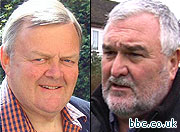The Welsh Government is being urged to restore prayers to council meetings following a similar move in England.
Last month in England Government minister Eric Pickles fast-tracked the commencement of new laws that overtook a controversial High Court decision.
The court had ruled the saying of prayers as a formal part of council meetings as unlawful.
Uphold
Mr Pickles’ move meant all major local authorities in England can continue to hold prayers, but Wales was not affected.
Now local councillors in Wales, from both Labour and the Conservatives, have argued for Welsh Local Government minister Carl Sargeant to implement similar changes.
Conservative Peter Davies, of Newport City Council, has written to Mr Sargeant saying: “Given that central Government has clearly recognised the urgent need to legitimise and uphold these traditions, I would urge you to take immediate action to introduce similar legislation in Wales to allow councils to continue to hold prayers in meetings.”
Mr Davies has also accused the Welsh Government of ‘dithering’ on the issue.
All agree
His Labour counterpart on the council, Allan Morris, commented: “It’s the one part of the meeting that we all agree on and we don’t argue. It sets a moral example to any youngsters who come to watch the meetings.”
Similar concerns have also been voiced by Janet Finch-Saunders, the shadow Local Government minister. She said: “For many families, faith remains an integral part of daily life in Wales”.
She also commented it was “odd” for ministers to “reject a simple way to protect the right to worship”, and added: “Welsh Labour Ministers now need to explain whether they intend to bring forward their own legislation to allow local councils, should they wish, to continue to hold prayers.”
Preposterous
A spokesperson for Carl Sargeant criticised Mr Pickles’ move, saying “one really has to wonder if this is the most urgent matter crossing Eric Pickles’ desk”.
The row over council prayers as a formal part of council meetings became re-ignited following the High Court ruling.
Mr Justice Ouseley’s decision faced widespread criticism, including from one MP who described it as “preposterous”.

